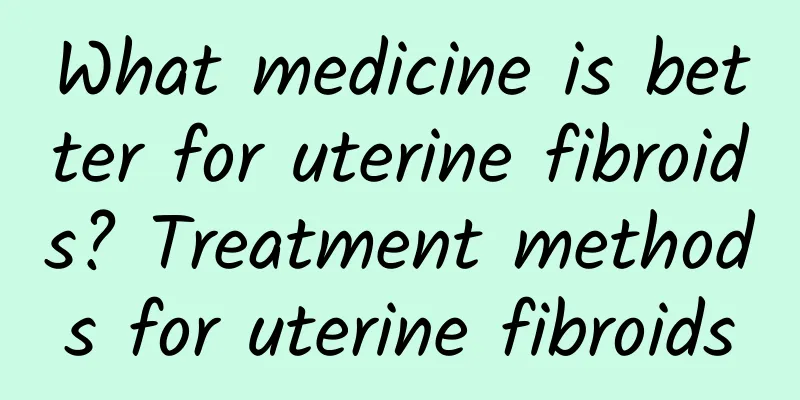What changes will occur in the body after having uterine fibroids?

|
Any disease has its symptoms, which warn you of the disease and can be used as a diagnostic standard. So what changes will occur in the body when you have uterine fibroids? Let's mainly talk about the symptoms of uterine fibroids . The main symptoms of uterine fibroids are as follows: (1) Increased menstruation Increased menstruation is the most obvious symptom of uterine fibroids. It often occurs in submucosal and intramural fibroids, and manifests as menorrhagia, prolonged menstruation or irregular vaginal bleeding. The main reasons for increased bleeding are: the area of the endometrium increases, the endometrium proliferates due to the effect of estrogen, the fibroids hinder the contraction of the uterus, and affect the blood circulation, causing endometrial congestion. Due to long-term bleeding, patients often have varying degrees of anemia. (II) Compression symptoms Compression symptoms are also very common symptoms of uterine fibroids. Fibroids located in the lower part of the uterus and cervix, if embedded in the pelvic cavity, can compress pelvic tissues and nerves, causing lower abdominal pain and back pain. Fibroids growing forward or backward can compress the bladder, urethra or rectum, causing frequent urination, dysuria, urinary retention or constipation. When fibroids grow to both sides, they form broad ligament fibroids, which can compress the ureter and cause hydroureteral or renal pelvis. (III) Lower abdominal mass When the subserosal or intramural fibroids grow beyond the pelvic cavity, patients can usually feel the mass themselves and go to the hospital for treatment, which may be accompanied by a feeling of falling. 4. Impact on pregnancy and childbirth Subserosal fibroids generally do not affect conception. However, when intramural fibroids located in the uterine horns compress the interstitial part of the fallopian tubes and submucosal fibroids cause endometrial infection, or when fibroids are complicated by endometrial hyperplasia, they can cause infertility. If conception is achieved, insufficient blood supply or narrowing of the uterine cavity may sometimes hinder fetal development, causing miscarriage and premature birth. (V) Pain Pain is a relatively rare symptom of uterine fibroids. In addition to the pain caused by compression of the pelvic nerves, pedunculated submucosal fibroids cause uterine contractions in the uterine cavity and produce pain. When the fibroids block the cervical canal and hinder the outflow of menstrual blood, it can cause dysmenorrhea. When the pedicle of a pedunculated subserosal fibroid is twisted or when the uterine fibroids undergo red degeneration or infection during pregnancy, it can cause more severe abdominal pain. The above are the physical manifestations of the symptoms of uterine fibroids. Understanding the symptoms of uterine fibroids is important for the prevention and treatment of uterine fibroids. For more information, please visit the uterine fibroid disease special topic at http://www..com.cn/fuke/zgjl/ or consult an expert for free. The expert will then give a detailed answer based on the patient's specific situation. |
<<: Vaginitis should be detected and treated early to prevent recurrence
>>: What are the symptoms of irregular menstruation in women?
Recommend
What to do if you have the urge to urinate during your period
What should I do if I always feel like urinating ...
Is vulvar leukoplakia vitiligo?
Vulvar leukoplakia, also known as female vulvar l...
What causes lower abdominal pain in women? It may be a gynecological disease
Women's lower abdominal pain is a common phen...
"Liver wrapped in oil" special medicine! Weight loss + health management
Fatty liver is not a disease, but it is a health ...
The causes of multiple uterine fibroids How do multiple uterine fibroids form?
Women with childbearing experience are immune to ...
Experts guide the correct use of drugs for hyperprolactinemia
The disease of hyperprolactinemia has existed in ...
Let me tell you about some common symptoms of cervical erosion
Nowadays, many women may suffer from cervical ero...
Can I exercise if I have an ectopic pregnancy?
Female friends should know that ectopic pregnancy...
Patients with irregular menstruation may also have symptoms such as dark yellow face
Patients with irregular menstruation may also hav...
Three effective treatments for cervical hypertrophy
The disease of cervical hypertrophy needs early t...
What is the pathogenesis of ovarian cysts?
What is an ovarian cyst and what is its pathogene...
What tests are needed to confirm chocolate cysts?
Chocolate cysts are a very common gynecological t...
Bird flu is coming! A table tells you which dishes you can't eat
An outbreak of highly pathogenic avian influenza ...
What are the hazards of cervical erosion in women? Cervical erosion has three major hazards to women
What are the dangers of cervical erosion? 1. Caus...
To reduce the risk of diabetes and cardiovascular disease, nutritionists recommend: low-fat, low-sugar, low-sodium healthy meal boxes
People who often eat out for three meals a day ar...









